Haz clic aquÍ para leer en español
A few fronts on which we are experiencing process and procedure in Ushuaia are:
1) Hiking Logistics
It would seem there are not physical topographic maps to be had on the island of Tierra del Fuego. “We know the island like the back of our hands,” the locals shrug. Many of them work as guides in industries such as skiing, paddling, hiking, climbing, and mountaineering.
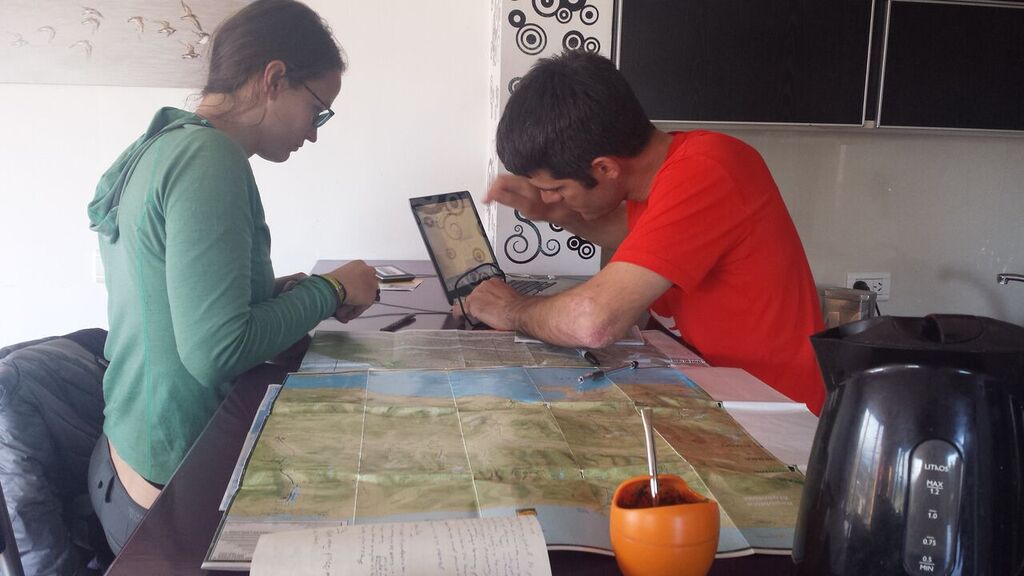 Hernan of Canal Fun came by on our first day in town. He explained patiently and clearly why our plan to “hop” into Chile to start hiking was unlikely and fraught with legal uncertainty. While there is no physical border, being found with the wrong stamp can mean an expedited and forced departure from either country without an invitation back for some time.
Hernan of Canal Fun came by on our first day in town. He explained patiently and clearly why our plan to “hop” into Chile to start hiking was unlikely and fraught with legal uncertainty. While there is no physical border, being found with the wrong stamp can mean an expedited and forced departure from either country without an invitation back for some time.
Furthermore, he pointed out, “whoever drops you off is responsible for you, the carabineros may let you stay with them at their border outpost for a day but then they will send you back.” His guidance was on point and well-grounded from 20 years of guiding experience on the island.
Our plans of beginning in Yendegaia bay, where the Chileans hope to one day end the Caretera Austral, were immediately upended.
The adjustment was quick as he showed us the Andes just to our north on this side of the imaginary line. Explaining the way around or across lake Fagnano, he told us about a trail locals are developing just north of the lake which passes through some beautiful terrain. He then advised and connected us to another friend and incredibly knowledgeable local guide, Dani.
Dani has trekked the length of Tierra de Fuego several times, and even from his first questions, it was clear he knows his stuff. A few days later he invited us to his home where he uploaded routes onto our GPS and reviewed a lot of details and specifics.
There is a sense of responsibility which comes with sharing this information. From here, for as long as we work our way across this island with his information, our actions and well-being reflect back on him. This is a sentiment we have heard reiterated many times among South Americans and is something which we do not experience as much in the U.S. It is not a matter to be taken lightly.
In this endeavor, we carry many with us. Hopes, dreams, expectations. The balance of self and what others have put into it is important. From those of you who have donated generously, those who share the story and help spread the word, those who call and write, those we meet along the way – you are with us in each step, in each resupply of food; each of you is informing the interactions along this journey and fill my mind across the kilometers and miles.
2) Money Exchange
Value of the Argentine peso is volatile. Since the devaluation of their money and with restrictions on how many USD can be withdrawn, the population practice “Dolar Blue.” Where official exchange may give 9 or 10 pesos to the USD, on the Blue they trade for 13-15 pesos. While technically illegal, the practice is relatively open and relaxed. Any hostel or business will happily direct you to an exchange place where you simply ask to make an exchange. They take it from there, careful with their language. By these means you can stretch your dollar when traveling in Argentina.
3) Presidential Elections
“You are here for a historical election. This vote determines the future of our country,” Cocó espoused passionately as we strode toward the polls. In Argentina, voting is mandatory, yet most of the population participate with pride. Experiencing a political and national upheaval as recent as 2001 will do that to a people.
During that time, when their currency was devalued by then president Fernando de la Rúa, Coco speaks of watching a fellow protester, not a dozen feet away, drop dead when police opened fire on the people.
This election is between Mauricio Macri of the pro party and Daniel Scioli of the Frente para la Victoria party. Campaigning stops 24 hours before the election. Neither people nor media may speak of the candidates until after they have cast their ballot. The night before the election most people stay in, reflecting and preparing.
Polls are at local schools to which each citizen is assigned, their names appearing on a printed list taped to the wall. Identity and ballot are verified by 1 presidente and a group of fiscales. One fiscal de la nacion and then one from each participating party.
An envelope is handed down the line and Cocó goes into the Dark Room, inserts a ballot and seals it. Coming out, they all watch as she places the envelope into the urna.
While police staff the the polling place, branches of the military and border police are also present. The gendarmerie are in charge of transporting the ballot boxes.
There is an air of respect around the process.
They do not wear stickers.
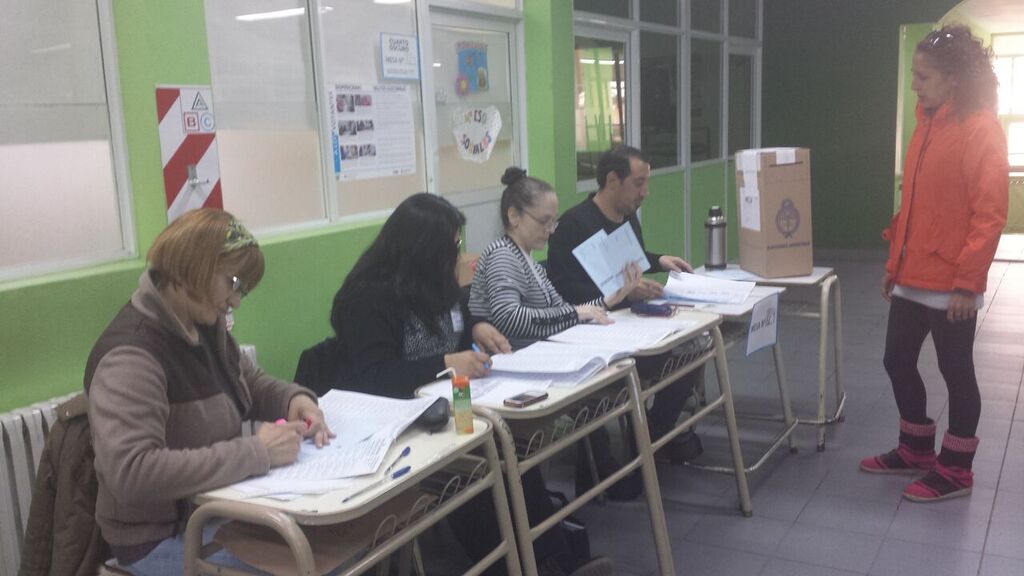 They can, by the color of jacket they wear, imply their political leanings. Orange- Scioli and yellow- Macri. Coco dug through the closet to find the orange jacket she wears to the polling place each year.
They can, by the color of jacket they wear, imply their political leanings. Orange- Scioli and yellow- Macri. Coco dug through the closet to find the orange jacket she wears to the polling place each year.
By the time you read this, party power will have shifted. Democracy is alive so long as more than 50% of the people celebrate the outcome.
Procesos y procedimientos
Traduccion por Henry Tovar
1) La logistica de la ruta.
Pareciera que no hay mapas topográficos en físico en la Isla de Tierra del Fuego. ¨conocemos la isla como las palmas de nuestras manos¨, dicen los locales encogiendose de hombros. Muchos de ellos trabajan como guías en industrias como el esquí, remo, senderismo, escalada y montañismo.
 Hernan de ¨Canal Fun¨ paso a visitarnos en nuestro primer dia en el pueblo. Explicó con paciencia y claridad por qué nuestro plan de ¨saltar¨ a Chile para iniciar el senderismo era poco probable y estaba plagado de incertidumbre juridica. Aunque no existe una frontera física, ser encontrado con el sello equivocado puede significar una salida expedita y forzada de uno u otro país, y sin invitación para poder regresar de nuevo en algún tiempo.
Hernan de ¨Canal Fun¨ paso a visitarnos en nuestro primer dia en el pueblo. Explicó con paciencia y claridad por qué nuestro plan de ¨saltar¨ a Chile para iniciar el senderismo era poco probable y estaba plagado de incertidumbre juridica. Aunque no existe una frontera física, ser encontrado con el sello equivocado puede significar una salida expedita y forzada de uno u otro país, y sin invitación para poder regresar de nuevo en algún tiempo.
Por otra parte, señaló, ¨quién sea que te deje en el lugar es responsable por ti, quizás los carabineros te permitan quedarte con ellos en su puesto fronterizo por un día, pero luego te enviarán de vuelta¨. Su guía estabaen punto y bien fundamentada con 20 años de experiencia guiando en la isla.
Nuestros planes de iniciar en la Bahía de Yendegaia, donde los Chilenos esperan algún día ponerle fin a la carretera Austral, se cancelaron inmediatamente.
El ajuste fue rápido al momento que nos mostró los Andes sólo para nuestro norte en este lado de la linea imaginaria. Explicandonos la via alrededor o a través del lago Fagano, nos habló de una ruta que los locales estan desarollando justo al norte del lago, que pasa a través de de un terreno hermoso. Luego nos aconsejó y nos conecto con otro amigo y guía local increiblemente bien informado, Dani.
Dani ha caminado la longitud de Tierra del Fuego varias veces, e incluso desde la primera pregunta, estuvo claro que el sabia lo suyo. Unos días más tarde, nos invitó a su casa, donde el subió rutas a nuestro GPS y revisó una gran cantidad de detalles y datos específicos.
Hay un sentido de responsabilidad que viene con el intercambio de esta información. A partir de aquí, durante el tiempo en que trabajamos nuestro camino a través de esta isla con su información, nuestras acciones y bienestras se reflejan de vuelta a él. Este es un sentimiento que hemos oído reiteradas veces entre los Sudamericanos y es algo que no experimentamos tanto en los Estados Unidos. Nos es una cuestión que debe tomarse a la ligera.
En este esfuerzo, llevamos a muchos con nosotras. Esperanzas, sueños, expectativas. El balance entre si mismo y lo que otros han puesto en él es importante. De aquellos que han donado generosamente, aquellos que comparten la historia y ayudan a difundir la palabra, a los que llaman y escriben, a los que nos encontramos en el camino – que están con nosotros en cada paso, en cada rebastecimiento de alimentos; cada uno de cada uno de ustedes esta informando las insteracciones a lo largo de este viaje y llenan mi mente a través de los kilometros y millas.
2) Cambio de moneda.
El valor del peso Argentino es volatil, desde la devaluación de su dinero y con las restricciones de la cantidad de dólares americanos que pueden ser retirados, la población practica el ¨Dolar Blue¨. Donde el cambio oficial te puede dar 9 o 10 pesos por dólar, en el ¨Blue¨ se comercia de 13 a 15 pesos por dólar. Si bien técnicamente es ilegal, la practica es relativamente abierta y relajada. Cualquier negocio o albergue estará encantado de dirigirte a un lugar de intercambio donde simplemente pides el intercambio. Ellos lo toman de allí, con cuidado en su lenguaje. Por estos medios se puede estirar los dólares cuando se viaja en Argentina.
3) Elecciones presidenciales.
¨Estas aquí para una elección historica, este voto determina el futuro de nuestro país¨. Cocó expuso con pasión mientras se dirigia hacia las urnas de votación. En Argentina, el voto es obligatorio, pero la mayoria de la población participa con orgullo. Experimentar una agitación política y nacional como la reciente en el 2001 hace a una persona sentir eso.
Durante ese tiempo, cuando su moneda se devaluó por el entonces presidente Fernando de la Rúa, Cocó habla de haber visto a un amigo protestante, a no mas de una docena de pies de distancia, caer muerto cuando la policia abrío fuego contra las personas.
Esta elección es entre Mauricio Macri del partido PRO y Daniel Sicioli del frente para la Victoria. La campaña se detiene 24 horas antes de la votación. Ni la gente ni los medios de comunicación pueden hablar de los candidatos hasta después de haber emitido su voto. La noche antes de la elección la mayoría de las personas permanecen en reflexión y preparación.
Las urnas de votación estan en las escuelas locales, que se les asignan a cada ciudadano, sus nombres figuran en una lista impresa pegada a la pared. Identidad y la boleta electoral son verificadas por un (1) presidente y un grupo de fiscales. Un fiscal de la nación y luego uno de cada partido participante.
Un sobre se desliza debajo de la linea y Cocó entra en la habitacion oscura, inserta la boleta de votacíon y la sella. Al salir, todos ven como ella coloca la boleta en la urna.
Mientras que el personal de la policía cuida el lugar de la votación, las ramas de la policía militar y de la frontera también estan presentes. La guardia civil se encarga de transportar las urnas.
Hay un aire de respeto durante el proceso.
No llevan calcomanias adhesivas.
 Ellos pueden, por el color de la chaqueta que visten, implicar la inclinación politíca. Scioli naranja y amarillo Macri. Cocó buscó en el armario para encontrar la chaqueta de color naranja que lleva al lugar de votación cada año.
Ellos pueden, por el color de la chaqueta que visten, implicar la inclinación politíca. Scioli naranja y amarillo Macri. Cocó buscó en el armario para encontrar la chaqueta de color naranja que lleva al lugar de votación cada año.
En el momento en que tú leas esto, el poder del partido habrá cambiado. La democracia está viva, siempre que más del 50% de la población celebren el resultado.
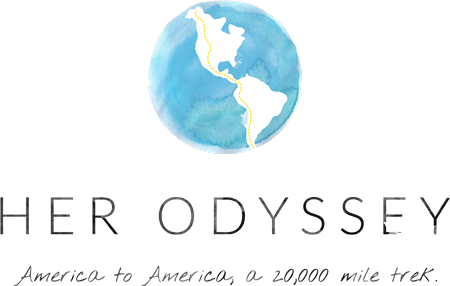


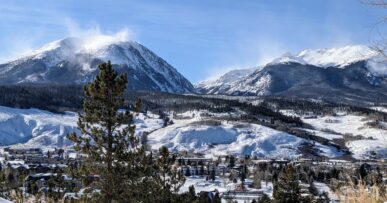
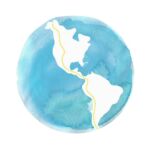

Comments (1)
Alwaysvgreat to hear about your travels. Makes us feel as if we are there with you. Sorry about the deviation, but glad you are meeting great people to advise you. So proud of you taking this journey. All the best. Henry a,d jaki